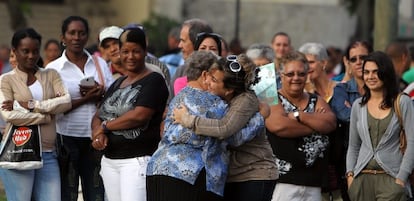European Union prepares to defrost icy relations with Cuba
Brussels will negotiate a new policy with Havana after 17 years of Aznar’s “failed” Common Position

The European Union is preparing to normalize relations with Cuba after 17 years of a restricted policy aimed at encouraging more democratic freedoms on the Caribbean island, diplomatic sources told EL PAÍS on Wednesday.
The 28 member states want to negotiate a new framework to broaden the EU’s relationship with Havana beginning next year by revoking the Common Position policy that was introduced by then-Spanish Prime Minister José María Aznar in December 1996.
“The Common Position has not been effective during this time,” said one source in Brussels. “It is better that we iron out our differences through a new policy.”
Nevertheless, diplomatic sources are stressing the need to continue pushing the government of Raúl Castro toward respect for human rights.
We have seen positive changes in the past years, above all, in the past months"
The demand for fundamental freedoms for all Cubans, as outlined in the 1996 document, has been one of the main arguing points among EU members over whether the bloc should normalize its relations with the Castro government.
Havana has rejected the Common Position policy, saying that it is interference in its internal affairs.
In 2010, then-Prime Minister José Luis Rodríguez Zapatero unsuccessfully tried to muster support for a change in the European Union’s position on Cuba. But Poland and Czech Republic – both former Soviet bloc nations – had been inflexible when it came to discussions on shifts in relations with Havana.
Cuba is a rare case in EU foreign policy. It is the only Latin American nation where Brussels has no institutional relations – although there has been cooperation in the past – and practically the only government that the bloc has taken a common position against.
Aznar’s strategy was aimed at pressuring the Havana government into making a transition to a pluralist democracy, and practically closed the doors to any type of negotiations between the EU and Cuba unless there were notable advances in human rights and fundamental freedoms on the island.
But the failure of the policy and the ongoing reforms that President Raúl Castro has been initiating on the island have encouraged the majority of EU nations to take another look at that Common Position strategy, diplomats said.
While Poland and Czech Republic had been adamant in the past to keep the Common Position intact, sources said that both countries now seem willing to agree to open a dialogue with Havana – a decision that may be taken as early as next month.
“Czech Republic has no concerns because all of the conditions relative to human rights will be included in the mandate for negotiations, which will be given to the [European] Commission, and that is why we are supporting it,” said a spokesman for the Czech Republic EU representative.
Just last week during a visit to the island, Dutch Foreign Minister Frans Timmermans urged the EU to take a new look at its relationship with Cuba. He said that the best way to promote change on the Communist island was through dialogue, not isolation.
For some time, many of the bloc’s 28 members have been uncomfortable with the Common Position, which impedes open dialogue with Havana, and have established bilateral relations with Castro’s government on their own, including signing treaties.
“We have seen positive changes in the past years, above all, in the past months,” said one diplomat with regard to the positions of member states.
At the same time, many diplomats fear that the EU will be left out when there is an eventual transition to democracy, because there have not been any official open channels between Brussels and Havana.
The economic figures also weigh in favor of pushing for new dialogue with Castro’s government. The EU is the biggest investor in Cuba and the island’s largest trading partner, after Venezuela, with nearly two billion euros in European exports sent annually to the Caribbean nation, according to statistics provided by the Spanish Embassy in Havana. But Cuban exports to the EU only amount to about 700 million euros annually. More than half of all foreign visitors to the island come from EU member states.
Tu suscripción se está usando en otro dispositivo
¿Quieres añadir otro usuario a tu suscripción?
Si continúas leyendo en este dispositivo, no se podrá leer en el otro.
FlechaTu suscripción se está usando en otro dispositivo y solo puedes acceder a EL PAÍS desde un dispositivo a la vez.
Si quieres compartir tu cuenta, cambia tu suscripción a la modalidad Premium, así podrás añadir otro usuario. Cada uno accederá con su propia cuenta de email, lo que os permitirá personalizar vuestra experiencia en EL PAÍS.
¿Tienes una suscripción de empresa? Accede aquí para contratar más cuentas.
En el caso de no saber quién está usando tu cuenta, te recomendamos cambiar tu contraseña aquí.
Si decides continuar compartiendo tu cuenta, este mensaje se mostrará en tu dispositivo y en el de la otra persona que está usando tu cuenta de forma indefinida, afectando a tu experiencia de lectura. Puedes consultar aquí los términos y condiciones de la suscripción digital.









































